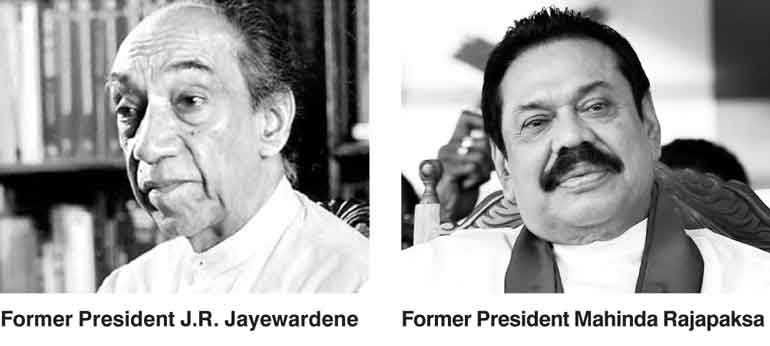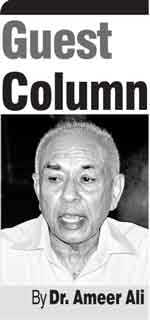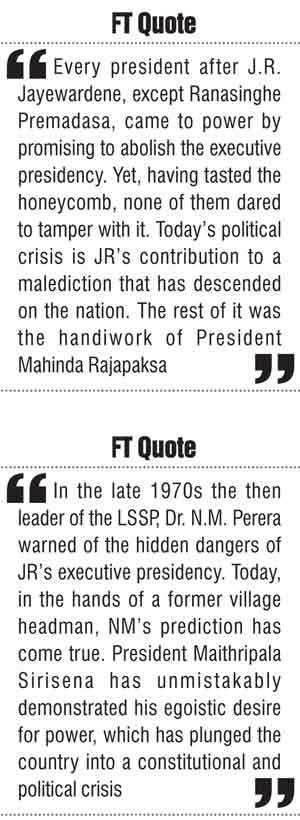Wednesday Feb 18, 2026
Wednesday Feb 18, 2026
Saturday, 17 November 2018 00:10 - - {{hitsCtrl.values.hits}}

 Sri Lanka over the last few weeks has experienced a twin crisis. One is political provoked by its Constitution, and the other economic engendered by its politics. However, this crisis is the combined effect of two previous presidencies, those of J.R. Jayewardene (1978-89) and Mahinda Rajapaksa (2005-15). I prefer to call it the JR-MR-Effect. This effect is destroying the island’s proud democratic heritage and debilitating its struggling economy and peoples’ welfare.
Sri Lanka over the last few weeks has experienced a twin crisis. One is political provoked by its Constitution, and the other economic engendered by its politics. However, this crisis is the combined effect of two previous presidencies, those of J.R. Jayewardene (1978-89) and Mahinda Rajapaksa (2005-15). I prefer to call it the JR-MR-Effect. This effect is destroying the island’s proud democratic heritage and debilitating its struggling economy and peoples’ welfare.
J.R. Jayewardene
In 1977, Jayewardene (JR), a paragon of neoliberal capitalism, and his United National Party (UNP) were swept to power at the elections with an outright majority to form a new government with JR as prime minister. The UNP won 140 of the 168 seats in the Parliament with 50.92% of the total votes. It was indeed a clear mandate.
However, this outcome did not satisfy JR who always had nightmares about the critical role ethnic minorities such as the Tamils and Muslims and political minorities such as the leftists like the Sama Samajists and Communists played in the Legislature to block, amend and even defeat what they considered as unfair legislations.
Being an arch enemy of Marxist socialism JR detested the previous SLFP-led socialist coalition Government of Sirimavo Bandaranaike. For over 30 years since the country’s independence he was biding his time for an opportunity to finish off once and for all the political influence of minorities. The 1977 elections provided him with that opportunity.
The first thing he did was to initiate a total U-turn in the country’s economic direction. More than 30 years of State-market mixed economic experiment was given up in favour of a competitive free market model without any restraint. Capitalism was reintroduced with a vengeance, reflecting JR’s all or nothing philosophy. As a result of this reversal economic inequality widened and poverty deepened to become a systemic phenomenon.
He wanted to transform Sri Lanka into another Singapore. The economic impact of his open economy would have become perilous for millions of Sri Lankans had it not been for a window of opportunity opened for the nation’s surplus labour to migrate to the Middle East. It is that opening which is sustaining the wellbeing of over a million households even today.
JR’s second epoch making measure was to abolish the Republican Colvin Constitution and introduce instead an all-powerful executive presidential constitution with proportional representation when electing members to the Legislature. Under this Constitution the president could do anything except, he bragged, “change a man into woman and vice versa”.
 He also thought that with proportional representation he would kill the electoral power of minorities and the leftists. While the leftists on their part were predicting for years that JR would be the midwife for a socialist revolution in Sri Lanka, he actually became the father of an ethnic pogrom in 1983.
He also thought that with proportional representation he would kill the electoral power of minorities and the leftists. While the leftists on their part were predicting for years that JR would be the midwife for a socialist revolution in Sri Lanka, he actually became the father of an ethnic pogrom in 1983.
Although he failed to diminish the influence of minorities through his Proportional Representation model, the powers embedded in the Gaullist-like presidency has turned out to be a blessing to power-hungry and manipulative presidents who succeeded him.
In the late 1970s the then leader of the LSSP, Dr. N.M. Perera warned of the hidden dangers of JR’s executive presidency. Today, in the hands of a former village headman, NM’s prediction has come true. President Maithripala Sirisena has unmistakably demonstrated his egoistic desire for power, which has plunged the country into a constitutional and political crisis.
Mahinda Rajapaksa
Every president after JR, except Ranasinghe Premadasa, came to power by promising to abolish that presidency. Yet, having tasted the honeycomb, none of them dared to tamper with it. Today’s political crisis is JR’s contribution to a malediction that has descended on the nation. The rest of it was the handiwork of President Mahinda Rajapaksa (MR).
When MR became president in 2005 by default (he would not have won the election had the LTTE leadership not ordered Tamil voters to boycott the elections) he inherited a civil war. That civil war was the natural outgrowth of JR’s 1983 pogrom. Several attempts were made under previous presidents to seek a peaceful solution to the Tamil issue. MR too tried.
However, the LTTE leadership dreaming of an impossible military victory became arrogantly adamant and was not prepared for any compromise. To LTTE leadership it was an all or nothing choice for a separate Tamil Eelam. To MR therefore a military solution became unavoidable and that was when the current economic crisis had its immediate origins.
Any war is not a cheap affair and modern wars need expensive weapons to arm the soldiery. That requires enormous amount of money and no government today in a small country like Sri Lanka can raise that sort of money solely through taxing its people. The alternative therefore is to borrow.
However, in a democratic governance parliament has to approve government’s financial proposals. To MR that was not a problem, because it was an emergency situation and the Government’s propaganda machine portrayed the war not as one between a misguided rebellious group versus the rest, as it happened previously during the JVP insurrection in 1971, but as an existential confrontation between the Sinhalese and the Tamils.
That was how even JR justified his pogrom, as a legitimate Sinhalese response to Tamil atrocities. Thus the Sinhalese majority Parliament had no qualms in approving President MR’s requests. Irrespective of Parliament’s approval, JR’s executive presidency empowered the office holder to resort to any action to overcome an emergency. MR and his Defence Secretary, Gotabaya Rajapaksa, went to the global arms bazaar with borrowed money to procure modern weapons. The civil war ensued in earnest and the rest is history.
No doubt MR won the war quite comprehensively although he lost the peace. He deserves to be congratulated for getting rid of the LTTE menace. Disappointingly though, he missed a golden opportunity to solve the Tamil issue once and for all and reunite the country. Instead, while sections of his party supporters were basking in the false warmth of schadenfreude, MR used the power of his office to go on a spending spree again with borrowed money to fund some of his questionable development projects.
A number of these projects were prestige oriented rather than growth oriented. As a result, the Mattala Airport for example, has turned out to be a white elephant, and the Hambantota Harbour project leased to the Chinese for 99 years has dragged Sri Lanka into the vortex of Indian Ocean geopolitics. Unsurprisingly, the spectre of re-colonisation has come to haunt the minds of some thinkers and writers in the country.
Above all, in the course of the nation’s war-associated but extravagant expenditure, the personal wealth that MR, his clan and cronies accumulated unleashed a wave of corruption and money laundering unprecedented in the history of the country. A kleptocracy was well and truly in the making during his regime. For this the people punished MR at the ballot box in 2015 when he recontested for the presidency; but his legacy of limitless borrowing, corruption and imprudent expenditure has continued under his successor President MS and Prime Minister RW.
What originated as a budgetary crisis in the wake of the civil war, because of profligate spending, reckless borrowing and pernicious corruption, all within JR’s neoliberal economic paradigm and his Gaullist presidency, has metamorphosed into a financial and economic crisis. This in short is the JR-MR effect that is now afflicting the country.
There is no magical solution to ward off the malediction. Instead, it requires hard and decisive rational thinking to redesign the national economic framework while at the same time rewriting the presidential Constitution. This is the immediate challenge facing the nation.
(The writer is attached to the School of Business and Governance, Murdoch University, Western Australia.)